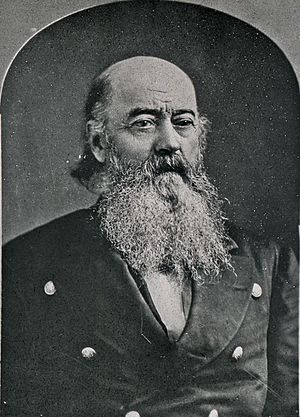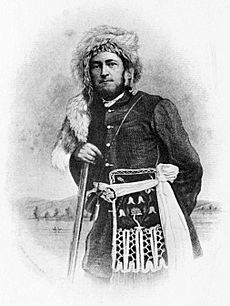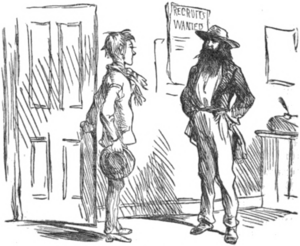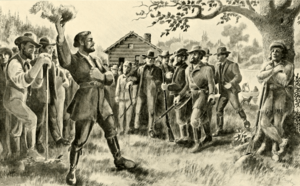Joseph Meek facts for kids
Quick facts for kids
Joseph Meek
|
|
|---|---|
 |
|
| Legislator in the Provisional Government of Oregon | |
| In office 1846–1847 |
|
| Constituency | Tuality District |
| Marshal of Oregon Territory | |
| In office 1848–1853 |
|
| Appointed by | James K. Polk |
| Preceded by | Position created |
| Succeeded by | James W. Nesmith |
| Personal details | |
| Born |
Joseph Lafayette Meek
February 9, 1810 Washington County, Virginia |
| Died | June 20, 1875 (aged 65) Hillsboro, Oregon |
| Spouse | Virginia (3rd wife) |
| Relations | Stephen Meek (brother) James K. Polk (cousin) |
| Occupation | Trapper, politician |
Joseph Lafayette "Joe" Meek (born February 9, 1810 – died June 20, 1875) was an important pioneer, trapper, and politician. He lived in the Oregon Country and later the Oregon Territory of the United States. Joe Meek was a "mountain man" who trapped furs. He played a big part in creating the first government in Oregon. He was elected sheriff and later served in the Oregon legislature. After that, he became the United States Marshal for the Oregon Territory.
Early Life and Adventures
Joseph Meek was born on February 9, 1810, in Washington County, Virginia. When he was 18, he joined William Sublette and the Rocky Mountain Fur Company. For more than ten years, he traveled through the Rocky Mountains as a fur trapper.
Around 1829, Meek was with a trapping group near the Yellowstone River. A group of Blackfoot people scattered the trappers. This left Meek to travel alone into what is now Yellowstone National Park. He later described the area as "smoking with the vapor from boiling springs." He also mentioned "gasses, issuing from small craters."
In 1838, in Idaho, Meek married a woman from the Nez Perce tribe. Her name is not recorded, but Meek called her "Virginia." It was common for trappers to marry local women at that time.
By 1840, the fur trade was slowing down. People's fashion changed, and too many beavers had been trapped. So, Meek decided to move to the Oregon Country. On their way, Meek and other trappers guided a group of settlers to the Whitman Mission. They brought the first wagon to reach the mission on the Oregon Trail.
Life in Oregon Country
In Oregon Country, Joe Meek wore a bright red sash. He copied the French Canadian trappers who worked for the Hudson's Bay Company. He hoped that Native American tribes would think he was French Canadian and leave him alone.
In 1841, Meek settled in the Tualatin Valley, near Oregon City. He became involved in the area's political life. In 1843, meetings were held in Champoeg, Oregon to form a government. Meek was a strong voice for the American settlers. When the provisional government was formed, Meek was chosen as sheriff. He was also elected to the legislature in 1846 and 1847.
In late 1847, some Cayuse and Umatilla people attacked the Whitman Mission. Marcus Whitman, his wife Narcissa, and others were killed. Meek's daughter, Helen Mar Meek, who was 10, died during this event.
Meek traveled to Washington, D.C., to share the news of the killings, known as the Whitman massacre. He made a difficult winter journey, arriving in May. In Washington, he met with President James K. Polk, who was his cousin. Meek strongly argued for Oregon Country to become a federal territory.
The next spring, Joseph Lane was appointed Territorial Governor. Meek was made Territorial Federal Marshal. He served as Marshal for five years. In 1850, as Marshal, he was involved in the legal process that followed the Whitman massacre. Meek also helped organize the Oregon Volunteers. He led them in the Yakima Indian War and was promoted to major.
Later Years
Joe Meek passed away on June 20, 1875, at his home near Hillsboro, Oregon. He was 65 years old. His wife, Virginia, lived almost 25 years longer than him. She died on March 3, 1900. They are buried at the Tualatin Plains Presbyterian Church cemetery. Meek once said he wanted to live long enough to see Oregon "securely American."
His older brother, Stephen Meek, was also a trapper. Stephen is known for his role in the difficult journey called the Meek Cutoff.
Images for kids
 | Calvin Brent |
 | Walter T. Bailey |
 | Martha Cassell Thompson |
 | Alberta Jeannette Cassell |





